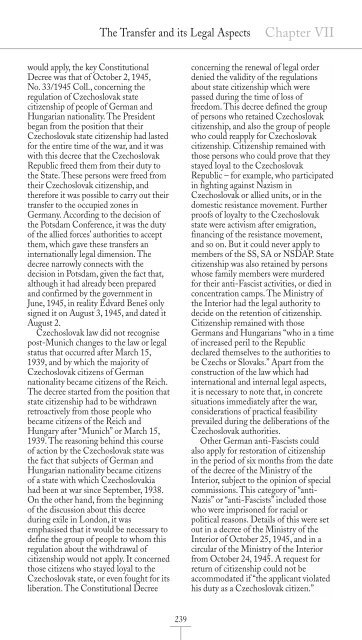the nationality of all inhabitants of the czech provinces and ...
the nationality of all inhabitants of the czech provinces and ...
the nationality of all inhabitants of the czech provinces and ...
You also want an ePaper? Increase the reach of your titles
YUMPU automatically turns print PDFs into web optimized ePapers that Google loves.
would apply, <strong>the</strong> key Constitutional<br />
Decree was that <strong>of</strong> October 2, 1945,<br />
No. 33/1945 Coll., concerning <strong>the</strong><br />
regulation <strong>of</strong> Czechoslovak state<br />
citizenship <strong>of</strong> people <strong>of</strong> German <strong>and</strong><br />
Hungarian <strong>nationality</strong>. The President<br />
began from <strong>the</strong> position that <strong>the</strong>ir<br />
Czechoslovak state citizenship had lasted<br />
for <strong>the</strong> entire time <strong>of</strong> <strong>the</strong> war, <strong>and</strong> it was<br />
with this decree that <strong>the</strong> Czechoslovak<br />
Republic freed <strong>the</strong>m from <strong>the</strong>ir duty to<br />
<strong>the</strong> State. These persons were freed from<br />
<strong>the</strong>ir Czechoslovak citizenship, <strong>and</strong><br />
<strong>the</strong>refore it was possible to carry out <strong>the</strong>ir<br />
transfer to <strong>the</strong> occupied zones in<br />
Germany. According to <strong>the</strong> decision <strong>of</strong><br />
<strong>the</strong> Potsdam Conference, it was <strong>the</strong> duty<br />
<strong>of</strong> <strong>the</strong> <strong>all</strong>ied forces’ authorities to accept<br />
<strong>the</strong>m, which gave <strong>the</strong>se transfers an<br />
internation<strong>all</strong>y legal dimension. The<br />
decree narrowly connects with <strong>the</strong><br />
decision in Potsdam, given <strong>the</strong> fact that,<br />
although it had already been prepared<br />
<strong>and</strong> confirmed by <strong>the</strong> government in<br />
June, 1945, in reality Edvard Beneš only<br />
signed it on August 3, 1945, <strong>and</strong> dated it<br />
August 2.<br />
Czechoslovak law did not recognise<br />
post-Munich changes to <strong>the</strong> law or legal<br />
status that occurred after March 15,<br />
1939, <strong>and</strong> by which <strong>the</strong> majority <strong>of</strong><br />
Czechoslovak citizens <strong>of</strong> German<br />
<strong>nationality</strong> became citizens <strong>of</strong> <strong>the</strong> Reich.<br />
The decree started from <strong>the</strong> position that<br />
state citizenship had to be withdrawn<br />
retroactively from those people who<br />
became citizens <strong>of</strong> <strong>the</strong> Reich <strong>and</strong><br />
Hungary after “Munich” or March 15,<br />
1939. The reasoning behind this course<br />
<strong>of</strong> action by <strong>the</strong> Czechoslovak state was<br />
<strong>the</strong> fact that subjects <strong>of</strong> German <strong>and</strong><br />
Hungarian <strong>nationality</strong> became citizens<br />
<strong>of</strong> a state with which Czechoslovakia<br />
had been at war since September, 1938.<br />
On <strong>the</strong> o<strong>the</strong>r h<strong>and</strong>, from <strong>the</strong> beginning<br />
<strong>of</strong> <strong>the</strong> discussion about this decree<br />
during exile in London, it was<br />
emphasised that it would be necessary to<br />
define <strong>the</strong> group <strong>of</strong> people to whom this<br />
regulation about <strong>the</strong> withdrawal <strong>of</strong><br />
citizenship would not apply. It concerned<br />
those citizens who stayed loyal to <strong>the</strong><br />
Czechoslovak state, or even fought for its<br />
liberation. The Constitutional Decree<br />
The Transfer <strong>and</strong> its Legal Aspects<br />
239<br />
Chapter VII<br />
concerning <strong>the</strong> renewal <strong>of</strong> legal order<br />
denied <strong>the</strong> validity <strong>of</strong> <strong>the</strong> regulations<br />
about state citizenship which were<br />
passed during <strong>the</strong> time <strong>of</strong> loss <strong>of</strong><br />
freedom. This decree defined <strong>the</strong> group<br />
<strong>of</strong> persons who retained Czechoslovak<br />
citizenship, <strong>and</strong> also <strong>the</strong> group <strong>of</strong> people<br />
who could reapply for Czechoslovak<br />
citizenship. Citizenship remained with<br />
those persons who could prove that <strong>the</strong>y<br />
stayed loyal to <strong>the</strong> Czechoslovak<br />
Republic – for example, who participated<br />
in fighting against Nazism in<br />
Czechoslovak or <strong>all</strong>ied units, or in <strong>the</strong><br />
domestic resistance movement. Fur<strong>the</strong>r<br />
pro<strong>of</strong>s <strong>of</strong> loyalty to <strong>the</strong> Czechoslovak<br />
state were activism after emigration,<br />
financing <strong>of</strong> <strong>the</strong> resistance movement,<br />
<strong>and</strong> so on. But it could never apply to<br />
members <strong>of</strong> <strong>the</strong> SS, SA or NSDAP. State<br />
citizenship was also retained by persons<br />
whose family members were murdered<br />
for <strong>the</strong>ir anti-Fascist activities, or died in<br />
concentration camps. The Ministry <strong>of</strong><br />
<strong>the</strong> Interior had <strong>the</strong> legal authority to<br />
decide on <strong>the</strong> retention <strong>of</strong> citizenship.<br />
Citizenship remained with those<br />
Germans <strong>and</strong> Hungarians “who in a time<br />
<strong>of</strong> increased peril to <strong>the</strong> Republic<br />
declared <strong>the</strong>mselves to <strong>the</strong> authorities to<br />
be Czechs or Slovaks.” Apart from <strong>the</strong><br />
construction <strong>of</strong> <strong>the</strong> law which had<br />
international <strong>and</strong> internal legal aspects,<br />
it is necessary to note that, in concrete<br />
situations immediately after <strong>the</strong> war,<br />
considerations <strong>of</strong> practical feasibility<br />
prevailed during <strong>the</strong> deliberations <strong>of</strong> <strong>the</strong><br />
Czechoslovak authorities.<br />
O<strong>the</strong>r German anti-Fascists could<br />
also apply for restoration <strong>of</strong> citizenship<br />
in <strong>the</strong> period <strong>of</strong> six months from <strong>the</strong> date<br />
<strong>of</strong> <strong>the</strong> decree <strong>of</strong> <strong>the</strong> Ministry <strong>of</strong> <strong>the</strong><br />
Interior, subject to <strong>the</strong> opinion <strong>of</strong> special<br />
commissions. This category <strong>of</strong> “anti-<br />
Nazis” or “anti-Fascists” included those<br />
who were imprisoned for racial or<br />
political reasons. Details <strong>of</strong> this were set<br />
out in a decree <strong>of</strong> <strong>the</strong> Ministry <strong>of</strong> <strong>the</strong><br />
Interior <strong>of</strong> October 25, 1945, <strong>and</strong> in a<br />
circular <strong>of</strong> <strong>the</strong> Ministry <strong>of</strong> <strong>the</strong> Interior<br />
from October 24, 1945. A request for<br />
return <strong>of</strong> citizenship could not be<br />
accommodated if “<strong>the</strong> applicant violated<br />
his duty as a Czechoslovak citizen.”


